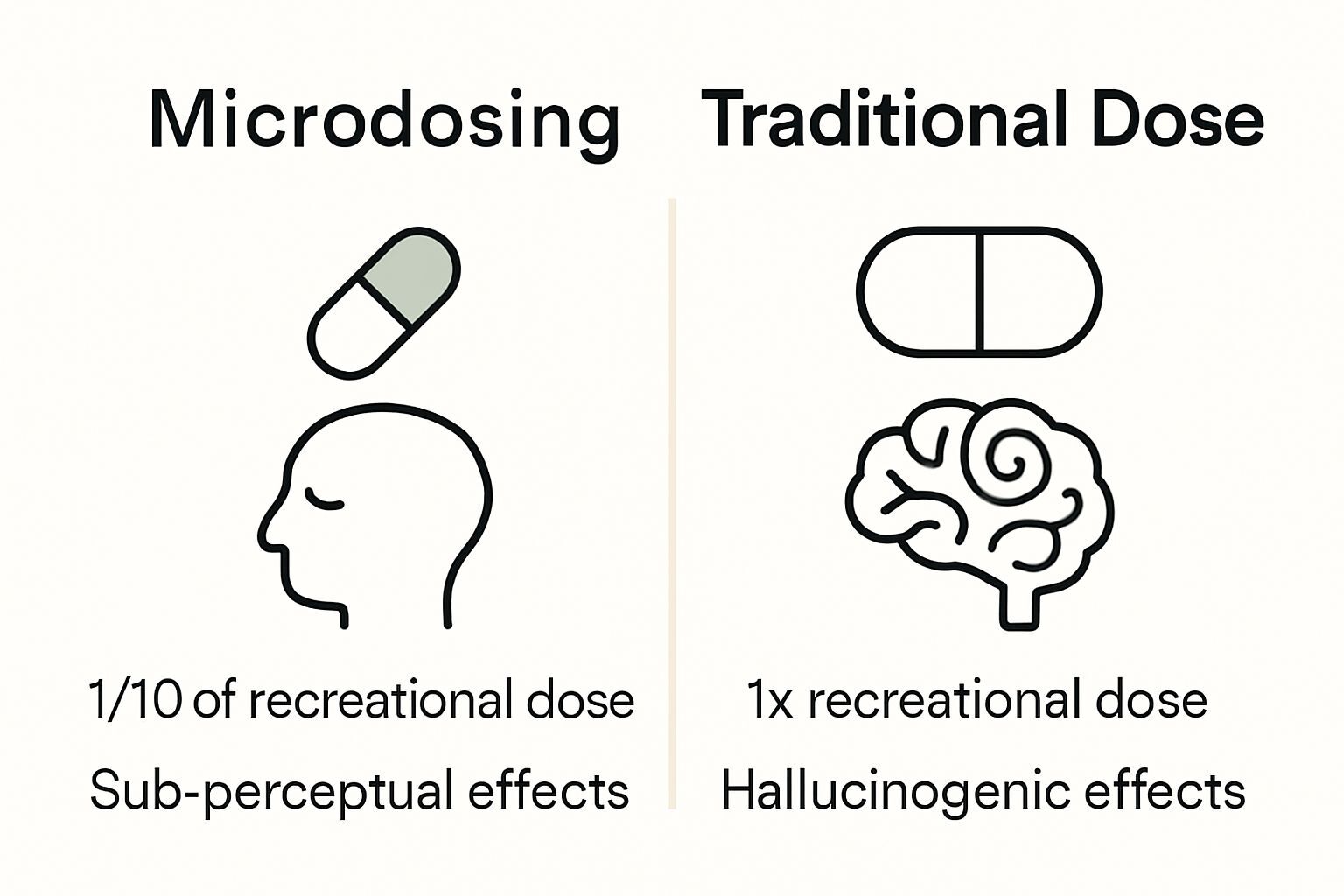Microdosing is getting attention for how it uses tiny amounts of psychedelics to help people focus, feel better, and think differently. Most would assume such small doses would have little effect, but studies show that even just 1/10 to 1/20 of a typical psychedelic dose can influence neuroplasticity and emotional balance. This subtle shift is changing how people approach cognitive performance and mental health without the intensity usually linked to psychedelics.
Table of Contents
- What Is Microdosing And Its Purpose?
- The Science Behind Microdosing For Motivation
- Why Microdosing Matters For Mental Health
- Key Concepts And Benefits Of Microdosing
- Real-World Applications Of Microdosing For Motivation
Quick Summary
| Takeaway | Explanation |
|---|---|
| Microdosing uses sub-hallucinogenic doses. | Approximately 1/10 to 1/20 of a standard dose enhances cognitive function without intense perceptual changes. |
| It enhances creativity and problem-solving. | Individuals report improved cognitive abilities and emotional stability, aiding in personal and professional challenges. |
| Microdosing can reduce anxiety and depression. | Research indicates that these minute doses might alleviate mental health symptoms through subtle neurochemical modulation. |
| Implement structured, intentional dosing. | Consistent measurement and careful tracking of psychological changes maximize benefits and ensure safe practice. |
| Promotes neuroplasticity and emotional resilience. | Microdosing may facilitate neuronal growth and flexibility, aiding emotional regulation and adaptive coping strategies. |
What is Microdosing and Its Purpose?
Microdosing represents a nuanced approach to consuming psychedelic substances at extremely low, sub-hallucinogenic doses with the intention of enhancing cognitive performance and emotional well-being. Unlike traditional psychedelic experiences, microdosing focuses on subtle neurological improvements without inducing intense perceptual changes or psychological disruptions.
To help clarify the similarities and differences between standard psychedelic doses and microdoses, the following comparison table summarizes key distinctions discussed in the article.
| Aspect | Standard Psychedelic Dose | Microdose (1/10 to 1/20 Dose) |
|---|---|---|
| Objective | Intense perceptual/psychological experience | Subtle cognitive and emotional enhancement |
| Sensory Effects | Strong hallucinations, altered perception | No perceptual changes, sub-hallucinogenic |
| Dosage Level | Full recreational/therapeutic dose | 5-10% of standard dose |
| Duration of Effects | Several hours (often intense) | Minimal, gentle effects over a few hours |
| Cognitive Impact | Can disrupt daily function | Enhances focus, creativity, flexibility |
| Emotional Impact | Intense emotional experiences | Subtle mood support, emotional balance |
| Functional Impairment | Significant; requires safe environment | None; regular tasks can be performed |

Understanding the Core Concept
At its fundamental level, microdosing involves consuming approximately 1/10 to 1/20 of a standard recreational dose of substances like psilocybin mushrooms or LSD. Research from Johns Hopkins Center for Psychedelic Studies suggests that these minute quantities can potentially stimulate neuroplasticity, enhance neural connectivity, and modulate brain chemistry in ways that promote mental clarity and emotional resilience.
The primary purposes of microdosing typically include:
- Improving cognitive function and mental focus
- Reducing anxiety and depressive symptoms
- Enhancing creativity and problem-solving capabilities
- Supporting emotional regulation and mood stability
Neurological and Psychological Mechanisms
Microdosing operates through complex interactions with the brain’s neurotransmitter systems. Psilocybin, the active compound in certain mushrooms, interacts with serotonin receptors, potentially recalibrating neural pathways associated with motivation and cognitive processing. A comprehensive study published in Nature Neuroscience indicates that these substances might promote neurogenesis neuronal growth and connectivity, which could explain improvements in cognitive flexibility and emotional processing.
For those interested in understanding how microdosing might support their personal wellness journey, our guide on microdosing for creativity provides deeper insights into potential cognitive benefits. By approaching microdosing with careful research, intentionality, and an understanding of individual neurochemistry, individuals may unlock subtle yet profound opportunities for mental enhancement and emotional well-being.
The Science Behind Microdosing for Motivation
Understanding the neurological mechanisms of microdosing requires exploring complex interactions between psychedelic compounds and brain chemistry. Scientific research reveals intricate pathways through which minute quantities of substances can potentially influence motivation, cognitive performance, and emotional regulation.
Neurochemical Pathway Modulation
Research from Frontiers in Neuroscience demonstrates that low-dose psychedelics interact with serotonin and dopamine receptors, critically modulating neural networks associated with motivation and reward processing. These interactions suggest that microdosing might reshape neurological patterns without inducing significant perceptual alterations.
Key neurochemical interactions include:
- Enhanced serotonin receptor connectivity
- Increased neuroplasticity in prefrontal cortex regions
- Potential dopaminergic pathway recalibration
- Reduced default mode network activity
Cognitive Performance and Neural Plasticity
Microdosing appears to stimulate neurogenesis and neural connectivity, potentially explaining improvements in cognitive flexibility. Emerging scientific literature indicates that these substances might activate brain-derived neurotrophic factor (BDNF), a protein crucial for neuronal growth and synaptic plasticity. This activation could contribute to improved learning capabilities, emotional processing, and intrinsic motivation.
Research published in Nature Neuroscience further suggests that psychedelic compounds can temporarily disrupt entrenched cognitive patterns, allowing individuals to approach challenges with increased mental agility and reduced psychological rigidity.
For individuals seeking structured approaches to integrating microdosing into their wellness routine, our psilocybin microdosing schedule guide provides comprehensive insights into safe and effective implementation strategies. By understanding the nuanced neurological mechanisms, practitioners can approach microdosing with informed intentionality and realistic expectations about potential cognitive and motivational enhancements.
Why Microdosing Matters for Mental Health
Mental health challenges represent a complex landscape where traditional therapeutic approaches sometimes fall short. Microdosing emerges as a potentially transformative alternative, offering nuanced neurological support that addresses underlying psychological patterns and emotional resilience.
Addressing Modern Psychological Challenges
Research from the Journal of Psychopharmacology highlights how microdosing can potentially mitigate symptoms associated with depression, anxiety, and emotional stagnation. By gently modulating neurotransmitter systems, these minute doses might provide an innovative pathway for individuals struggling with conventional mental health treatments.
Key psychological benefits potentially include:
- Reduced anxiety and depressive symptoms
- Enhanced emotional regulation
- Improved stress response mechanisms
- Increased psychological flexibility
Holistic Wellness and Neurological Recalibration
Microdosing represents more than symptomatic treatment. Neuroplasticity and emotional recalibration suggest a deeper approach to mental wellness, allowing individuals to interrupt entrenched psychological patterns. The subtle neurochemical interactions potentially reset default cognitive pathways, enabling more adaptive and resilient mental frameworks.
Comprehensive studies published in Translational Psychiatry indicate that microdosing might offer a unique mechanism for addressing treatment-resistant mental health conditions by promoting neurogenesis and emotional processing.
For those interested in exploring integrative mental health approaches, our guide on microdosing and meditation provides additional insights into holistic wellness strategies. By understanding microdosing as a nuanced tool for psychological support, individuals can approach mental health with greater complexity, compassion, and potential for meaningful transformation.
This table breaks down the main potential benefits of microdosing as highlighted throughout the article, summarizing the specific cognitive, emotional, and wellness outcomes mentioned by recent research.
| Benefit Area | Potential Outcomes |
|---|---|
| Cognitive Function | Increased focus, creativity, cognitive flexibility |
| Emotional Well-being | Reduced anxiety, improved mood regulation, resilience |
| Motivation | Enhanced drive, intrinsic motivation, positive mindset |
| Mental Health | Alleviation of depressive symptoms, better stress response |
| Professional Impact | Improved problem-solving, sustained productivity |
| Personal Growth | Psychological flexibility, emotional intelligence |
Key Concepts and Benefits of Microdosing
Microdosing represents a sophisticated approach to personal wellness that extends beyond traditional pharmaceutical interventions. By leveraging minute quantities of psychedelic substances, individuals can potentially unlock nuanced cognitive and emotional enhancements without experiencing intense psychoactive effects.
Foundational Understanding of Microdosing
Research from Imperial College London reveals that microdosing involves consuming sub-perceptual doses of psychedelic substances, typically ranging between 5-10% of a standard recreational dose. These microscopic quantities interact with neurological systems in ways that can subtly modulate cognitive function, emotional processing, and psychological flexibility.
Key principles of effective microdosing include:
- Precise, consistent dosage measurement
- Intentional and structured consumption protocols
- Regular self-assessment and tracking of psychological changes
- Understanding individual neurochemical responses
Comprehensive Benefits and Potential Outcomes
Microdosing offers a multifaceted approach to personal development, potentially influencing various aspects of mental and emotional functioning.
 Cognitive enhancement and emotional regulation emerge as primary potential benefits, with research suggesting improvements in creativity, problem-solving, and psychological resilience.
Cognitive enhancement and emotional regulation emerge as primary potential benefits, with research suggesting improvements in creativity, problem-solving, and psychological resilience.
A comprehensive study in Translational Psychiatry demonstrates that consistent microdosing might contribute to:
- Enhanced neural connectivity
- Reduced symptoms of anxiety and depression
- Improved emotional intelligence
- Increased intrinsic motivation
For practitioners seeking structured guidance on implementing microdosing practices, our psilocybin microdosing schedule guide provides comprehensive insights into safe and effective protocols. By approaching microdosing with scientific curiosity, personal intentionality, and a commitment to holistic wellness, individuals can explore a nuanced pathway to cognitive and emotional optimization.
Real-World Applications of Microdosing for Motivation
Microdosing transcends theoretical research, emerging as a practical tool for individuals seeking enhanced personal and professional performance. Contemporary applications demonstrate how subtle neurochemical interventions can potentially reshape motivation, productivity, and psychological resilience across diverse life domains.
Professional Performance and Creative Engagement
Research from the Journal of Psychopharmacology indicates that microdosing offers significant potential for professionals navigating complex cognitive challenges. Knowledge workers, entrepreneurs, and creative professionals report experiencing improved problem-solving capabilities, reduced cognitive friction, and increased intrinsic motivation.
Key professional domains experiencing microdosing interest include:
- Technology and software development
- Creative industries and design
- Academic research and scientific exploration
- Entrepreneurial and startup environments
- Strategic consulting and innovation sectors
Psychological Resilience and Personal Development
Beyond professional contexts, microdosing represents a nuanced approach to personal psychological optimization. Emotional agility and intrinsic motivation emerge as critical outcomes, with practitioners reporting enhanced ability to navigate complex emotional landscapes and maintain consistent engagement with personal goals.
Individuals often explore microdosing to address:
- Persistent motivational challenges
- Emotional regulation difficulties
- Cognitive performance plateaus
- Stress management and psychological adaptability
Longitudinal studies in Translational Psychiatry suggest that consistent microdosing might contribute to long-term psychological flexibility and improved self-regulation mechanisms.
For individuals interested in exploring social dimensions of microdosing, our guide on psilocybin for social anxiety provides additional context on psychological support strategies. By approaching microdosing with intentionality, scientific curiosity, and personal accountability, practitioners can potentially unlock sophisticated pathways for motivation and psychological growth.
Ready to Unlock Motivation and Focus With Science-Backed Microdosing?
If you are searching for a way to lift persistent brain fog, feel more motivated, or sharpen your focus, you are not alone. Our recent article uncovered how microdosing can help adjust brain chemistry, encourage mental clarity, and support lasting emotional balance. If you have ever battled with distraction, low mood, or the struggle to meet your goals, discovering the right microdosing approach could be transformative. Curious how others like you are making this shift? Explore real-world stories and resources in our MICRODOSING Archives • KIND STRANGER for honest advice and lived experience.

Now is the time to break through mental barriers. Visit Kind Stranger to browse expertly crafted psilocybin capsule and gummy options made for those who value wellness and cognitive support. Have questions about methods, safety, or legal guidance? Check out our Mental Health Archives • KIND STRANGER for trustworthy information. Join a community that cares about mindful, supported growth and get started today with choices made for your clarity and peace of mind.
Frequently Asked Questions
What is microdosing?
Microdosing involves consuming very small, sub-hallucinogenic doses of psychedelic substances, such as psilocybin or LSD, to enhance cognitive function and emotional well-being without experiencing intense perceptual changes.
How can microdosing improve motivation and focus?
Microdosing may enhance motivation and focus by modulating neurotransmitter systems, particularly serotonin and dopamine pathways, which can lead to improved cognitive flexibility and emotional regulation.
What are common substances used for microdosing?
Common substances used for microdosing include psilocybin mushrooms and LSD. These are taken in very small doses, typically 1/10 to 1/20 of a standard recreational dose.
What are the potential benefits of microdosing for mental health?
Potential benefits of microdosing for mental health include reduced anxiety and depressive symptoms, improved emotional regulation, enhanced creativity, and overall better mental clarity and focus.
Recommended
- Microdosing for Creativity: Boost Ideas and Focus in 2025 • KIND STRANGER
- Microdosing and Meditation: Enhance Focus and Wellbeing in 2025 • KIND STRANGER
- Psilocybin Microdosing Schedule Guide 2025: Safe and Effective Plans • KIND STRANGER
- Psilocybin for Social Anxiety: Natural Relief in 2025 • KIND STRANGER


Comments
There are no comments yet.